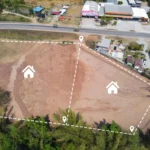Buying a piece of land is a big step, and it’s super important to make sure everything is correct and safe. At Marine Group, we know buying land can seem tricky. That’s why we’re here to help you every step of the way. This guide will make it easy to understand what must-have documents you need to check when you buy land in India.
Why Are These Papers So Important?
Think of these documents as the strong foundation for your land purchase. They make sure everything is clear and legal. Whether you’re buying land for the first time or you’ve done it before, having the right papers is key. They prove you own the land, help avoid problems, and make sure you follow all the rules. If you don’t have all the right papers, you could lose money, get into legal trouble, or even have your deal canceled.
What Good Do These Papers Do?
These legal papers are like official proof. They show who truly owns the land, what money is owed, and that all rules are followed. They confirm the seller has the right to sell, and they give you peace of mind that your purchase is real. Good paperwork helps with:
•Clear Ownership History: It shows who owned the land before you, making sure there are no hidden claims.
•Stopping Fights and Cheating: Good documents protect you from dishonest people and legal battles.
•Following Local Rules: They ensure your purchase is legal according to the laws of the area.
•Easy Registration: With all papers in order, officially registering your land is smooth and quick.
What Happens If Papers Are Missing or Wrong?
Not checking your documents carefully can lead to big problems, such as:
•Who Owns It? If the main ownership paper (title deed) is missing, many people could claim the land, leading to long fights.
•Deal Canceled: Missing important papers like the sale deed can make your whole purchase invalid.
•Hidden Debts: If you don’t have a certain certificate (Encumbrance Certificate), you might not know about loans or debts tied to the land.
•Slow Paperwork: Incomplete papers can make the official registration process take a very long time.
•Breaking Rules: If you don’t have all the needed approvals, you could face big fines.
•Loan Problems: Banks might not give you a home loan if the property doesn’t have all the necessary legal papers.
At Marine Group, we believe in being open and making our customers happy. We always check documents very carefully. We suggest you also get a lawyer to look at all the papers, check for any hidden debts, and confirm all rules are followed. This careful approach makes sure your land purchase is safe and clear for everyone.
Your Easy Checklist for Buying Land Safely
Here’s a simple list of the most important papers you need to check when buying land in India:
1. Sale Deed: The Main Paper for Ownership
The Sale Deed is the most important legal paper. It officially moves the land ownership from the seller to you, the buyer. It’s the solid proof of your purchase. This paper includes important details like the price, a full description of the land, how the sale will happen, and when you get the land. To be legal, the Sale Deed must be signed in front of an official and stamped correctly. You must make sure it correctly shows who owns the land, what the land is like, and how payments are made. Also, confirm that the seller truly has the right to sell the land. You need to pay a special tax (stamp duty) and registration fees for this paper to be legal. If it’s not registered, it’s not legal proof of ownership. This paper is extra important if you’re buying land that someone else owned before, as it clearly shows who owns it now and that you can sell or use it for a loan later.
2. Title Deed: Proving Who Really Owns It
The Title Deed is a basic legal paper that clearly shows who owns the land and that the ownership is moving from the seller to you. It has important information like the seller’s name, exact details about the land, and any existing loans or debts on the land. A good Title Deed means the land has a clear and sellable ownership, confirming the seller has the legal right to sell. After the ownership is moved, you must get the Immediate Title Deed, which is your main proof of ownership. To check a Title Deed carefully, you should:
•Get the Original Title Deed: Always ask the seller for the original paper. Make sure it hasn’t been changed in any way.
•Check Who Owned It Before: Make sure the land has a clear history of owners, with no arguments or unclear parts.
•Check for Debts: Get an Encumbrance Certificate to confirm the land has no loans, mortgages, or legal claims against it.
•Compare with Government Records: Carefully check the details in the Title Deed against official government land records to make sure they match and are real.
•Confirm Official OKs: Make sure the land follows all local city and legal rules and has all the necessary approvals.
•Ask a Lawyer to Check: It’s a very good idea to have an experienced lawyer check the paper to confirm it’s real and legally sound.
These careful steps are key to protecting you from fake deals and legal problems, making sure your land purchase is safe and real.
3. Encumbrance Certificate (EC): Finding Hidden Debts and Problems
An Encumbrance Certificate (EC) is a very important paper that shows if a property has any financial or legal problems, like unpaid loans, mortgages, or legal claims. It gives a full history of all past deals related to the property. This assures you, the buyer, that there are no unsolved debts that could stop the ownership transfer. A clean and current EC is super important for selling property, as it tells buyers the ownership is clear and helps sellers have a smooth, problem-free deal.
You can get an EC from the office where the property is registered. You or the seller need to fill out a form with property details and ask for records for a certain time, usually 10 to 30 years. The certificate will list any past debts, deals, or legal claims on the property. A ‘Nil Encumbrance Certificate’ means the property has no problems at all. If the EC has entries, it means there were past financial deals that need more checking. Understanding the EC correctly is vital for you to confirm a clear ownership, greatly lowering the risk of future legal issues.
4. Agreement to Sell: The First Step to Buying Land
An Agreement to Sell is a legal paper that clearly sets out the rules and conditions for buying and selling land between you and the seller. It includes important details like the agreed price, how payments will be made, the exact date you get the land, and specific details about the land. This agreement is crucial because it makes sure both sides do what they promised before the final Sale Deed is signed. Also, a registered Agreement to Sell is often needed when you apply for a home loan, as it proves the land deal happened. Without this basic paper, arguments about the terms or condition of the land can easily happen, leading to unwanted legal problems.
To protect both you and the seller, an Agreement to Sell should include key points like:
•Advance Payment & Penalty: Clearly state the advance money paid and what happens if someone doesn’t follow the rules.
•Possession & Transfer Date: Set the exact dates for when you get the land and when ownership officially moves.
•No Debts and Legal Clearances: Make sure the land is free from debts and has all needed legal approvals.
•Protection Clause: A part that protects both sides from future problems that weren’t expected.
•How to Solve Fights: A clear way to handle any disagreements that might come up.
5. Property Registration Papers: Making Your Ownership Official
Property registration papers are absolutely necessary to make your ownership legal and to follow all local laws. A key paper here is the Khata Certificate. This confirms that the property is officially registered with the local city office and that all property taxes have been paid. This certificate is vital for getting home loans and is a must-have when you sell the property. It’s very important to make sure the Khata Certificate is in the seller’s name and has correct details about the property. At Marine Group, we help our clients understand these official registration steps, making sure all papers are correct for a smooth ownership transfer.
6. Power of Attorney (POA): When Someone Else Acts for the Seller
If the seller is an NRI (Non-Resident Indian) or can’t be there in person for the deal, a Power of Attorney (POA) becomes a very important paper. A POA is a legal document that allows a chosen person (the agent) to act for the land owner (the principal) in matters about the sale. It’s crucial to check if the POA is real and if the agent has the legal power to sign the sale deed. The POA must be registered and officially stamped to be legal. Marine Group suggests getting legal advice to check any POA to avoid problems later.
7. Property Tax Receipts: Proof You Paid Your Dues
Paying property taxes regularly is a basic duty of a land owner. You, as the buyer, must ask to see all past property tax receipts to make sure there are no unpaid taxes. Unpaid taxes can become your problem as the new owner. These receipts prove that the property has been regularly checked for taxes and that all taxes have been paid up to date. This also helps confirm the land’s legal standing and ensures there are no hidden money problems.
8. Sanctioned Plan and Building Approval: Making Sure Construction is Legal
For land where buildings already exist or where you plan to build, the approved building plan and necessary approvals from the local city office are very important. These papers confirm that any building follows local building rules and laws. Checking these approvals stops future legal problems about illegal building or changes from the approved plans. Marine Group stresses how important these papers are to make sure your investment follows all city planning rules.
9. No Objection Certificates (NOCs): Clearing the Way
Depending on the type and location of the property, you might need different No Objection Certificates (NOCs) from various official groups. These could be NOCs from the fire department, environmental groups, or other official bodies. These certificates confirm that the property meets specific safety, environmental, or other rules and that these departments have no problems with the sale or development of the property. A careful check of all needed NOCs is essential to avoid future legal hurdles.
10. Khata Certificate and Extract: City Records Check
The Khata Certificate and its details are very important papers, especially in states like Karnataka. They prove that the property has been checked and taxes paid with the local city office. The Khata is basically a record of a property, showing details like the owner’s name, land size, location, and tax amount. It’s vital for registering property, transferring ownership, and getting building permits. Making sure the Khata is in the seller’s name and is up-to-date is a key step in checking everything carefully. Marine Group helps clients understand these local city rules to make sure the deal is smooth.
Why Choose Marine Group for Your Land Purchase?
•Expert Help: Our experienced professionals give you great advice about the Indian real estate market, helping you make smart choices.
•Full Document Check: We do thorough checks on all property papers, lowering risks and making sure you get clear ownership.
•Openness and Trust: We follow the highest standards of honesty, giving you full transparency throughout the deal.
•Easy Process: Our simple way of working makes your purchase smooth and quick, saving you time and effort.
•Customer First: Your happiness is our main goal. We are dedicated to making your dream of owning land come true.
Conclusion
Buying land in India needs careful attention and a good understanding of the legal papers involved. By carefully checking each document on this list, you can protect your investment and make sure your land deal is safe and real. Partner with Marine Group, and let us handle the difficult parts of real estate for you, building a future based on trust and strong foundations. Contact us today to start your journey towards a secure land investment.







1 Comment
https://shorturl.fm/IQ2TG